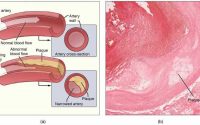Abdominal cramps and vaginal discharge: Causes and treatment
Many people experience abdominal cramps and vaginal discharge. Pain low in the tummy and around the belly button is usually described as cramping.
Some discharge from the vagina and cervix is usual. It varies in response to hormones produced as part of the female menstrual cycle. Vaginal discharge plays a vital role in keeping the vagina clean and preventing infection.
However, if the color, smell, or consistency seems unusual, especially if accompanied by itching, burning, or abdominal pain, it could be a sign of an infection or other condition and should not be overlooked.
This article looks at the most common causes of abdominal cramps and vaginal discharge. It also covers treatment, prevention, and when to see a doctor.
Causes
A person may experience abdominal cramps and vaginal discharge for many reasons. Some of the most common causes include:
Menstruation

It is common for a person to have abdominal cramps and vaginal discharge before and during a monthly period. Pain, which is known as dysmenorrhea, and which is associated with the shedding of the uterus lining, causes cramping.
Menstruation may also cause vaginal discharge. Its color and consistency vary during the monthly cycle, depending on the stage of ovulation.
Pregnancy
Abdominal pain is common in pregnancy. Ligaments in the abdomen, stretching to support the growth of a baby, are often the reason.
Gas, bloating, or constipation can also be behind abdominal cramps during pregnancy.
Anyone who experiences severe pain during pregnancy or has blood or any unusual vaginal discharge should go to the doctor. These could be signs of an ectopic pregnancy, pregnancy loss, or preterm labor, depending on the stage of the pregnancy.
Endometriosis
When someone has painful cramping before and during periods, pain with intercourse, and irregular bleeding patterns, endometriosis could be a reason.
Endometriosis is usually a chronic condition that happens over long periods of time. Women who have been through menopause are less likely to experience pain linked to endometriosis.
Bacterial vaginosis (BV)
BV is an infection in the vagina. It can cause abdominal pain and an increase in vaginal discharge with an unpleasant smell.
During pregnancy, up to 30 percent of women will experience BV. It is also the most common vaginal infection in women aged between 15 and 44 years old.
BV can develop after sex, douching, and using perfumed body wash around the vagina.
Sexually transmitted diseases (STDs)
Abdominal cramps may be a symptom of an STD, most commonly gonorrhea, chlamydia, and trichomoniasis.
When a person has noticeable changes in vaginal discharge, it can also be a sign of an STD. However, sometimes STDs develop without symptoms.
Pelvic inflammatory disease (PID)
In some people, an infection of the upper genital tract can lead to PID. This condition affects the uterus, fallopian tubes, and ovaries.
PID can cause similar symptoms to BV and STDs, such as
- dull aches and abdominal pain
- an increase in vaginal discharge
- discomfort in the vaginal area
Cervical cancer
Human papillomavirus (HPV) is a common STD and the cause of the majority of cervical cancers.
High-risk HPV types can develop into cervical cancer if left untreated. While there are often no signs of cervical cancer, vaginal discharge, abnormal bleeding, and pelvic pain can be among the indicators.

Doctors may prescribe antibiotics for some people with BV. This will depend on a person’s symptoms and whether they are pregnant. Anyone taking antibiotics should always make sure to complete the course to prevent reinfection.
Applying antibacterial gel to the vagina can also treat BV. Anyone doing this should ensure their hands are clean and dry when applying the gel.
Probiotic foods, such as those containing the bacteria Lactobacillus, may be effective in treating and preventing vaginal infections that cause discharge.
Using a gentle, fragrance-free soap and not douching may also help to prevent BV. People should also avoid wearing tight underwear, as this can lock in sweat that can lead to bacterial buildup.
STDs and PID
Anyone who is concerned that they may have an STD, or is in acute pain with new-onset discharge, fever, or a generalized feeling of being unwell, should see their doctor. It is important to treat STDs and PID with antibiotics if the diagnosis is confirmed.
Practicing safe sex, using condoms for protection, and having careful partner selection can prevent STDs.
HPV
A doctor will recommend treatment for people with HPV or cervical cancer. Attending regular cervical smear test appointments is essential.

Prevention
The following measures may help to prevent abdominal cramping and vaginal discharge:
- eating probiotic-rich foods, such as natural yogurt
- wearing clean, cotton underwear, and avoiding tight, nylon or synthetic fabrics
- keeping the vaginal area clean
- remaining hydrated by drinking enough water during the day
- including sources of fiber in the diet, such as from fruits, vegetables, and whole grains
- using contraception if pregnancy is not desired and taking care if a partner has an infection or STD
- using condoms for STD protection if not in a single-partner relationship

When to see a doctor
Anyone experiencing unusual abdominal cramping, pain, discharge, or bleeding that does not pass should see their doctor or gynecologist.
Source: Read Full Article


